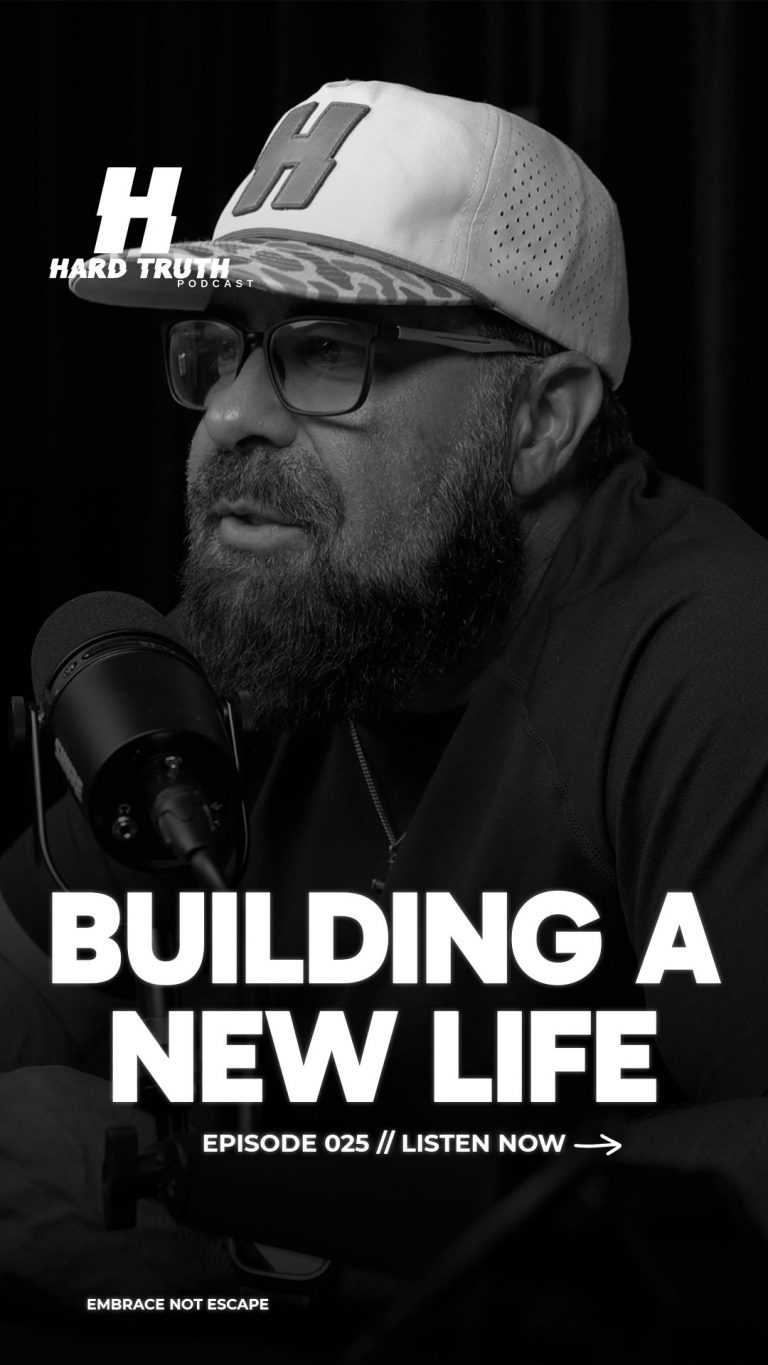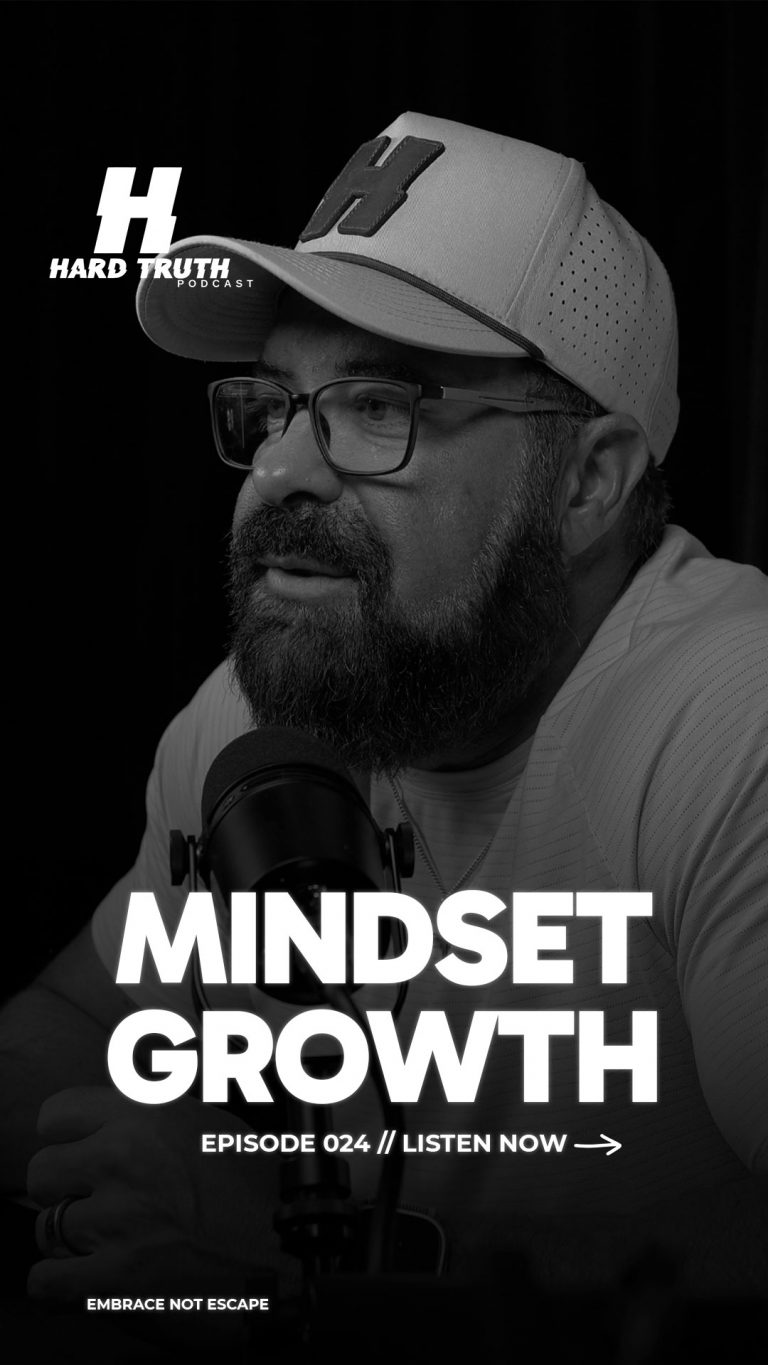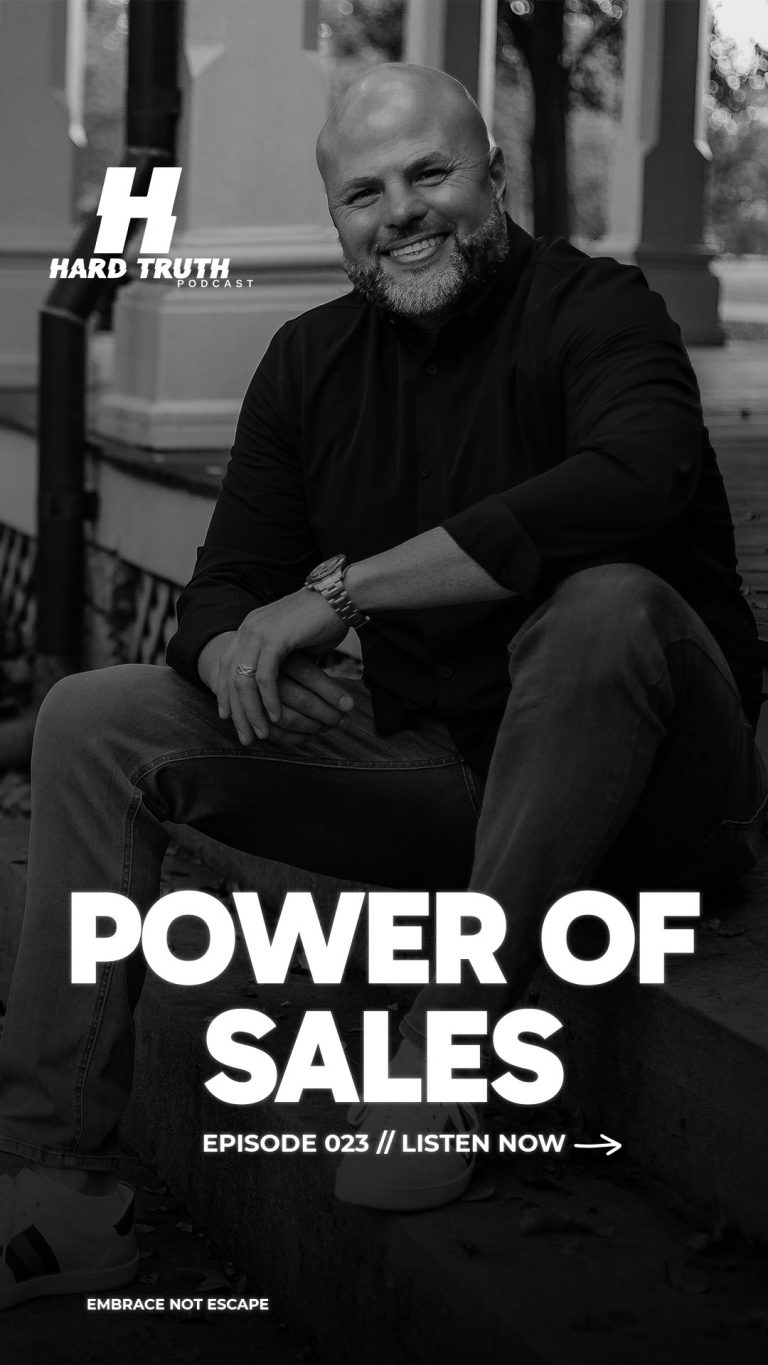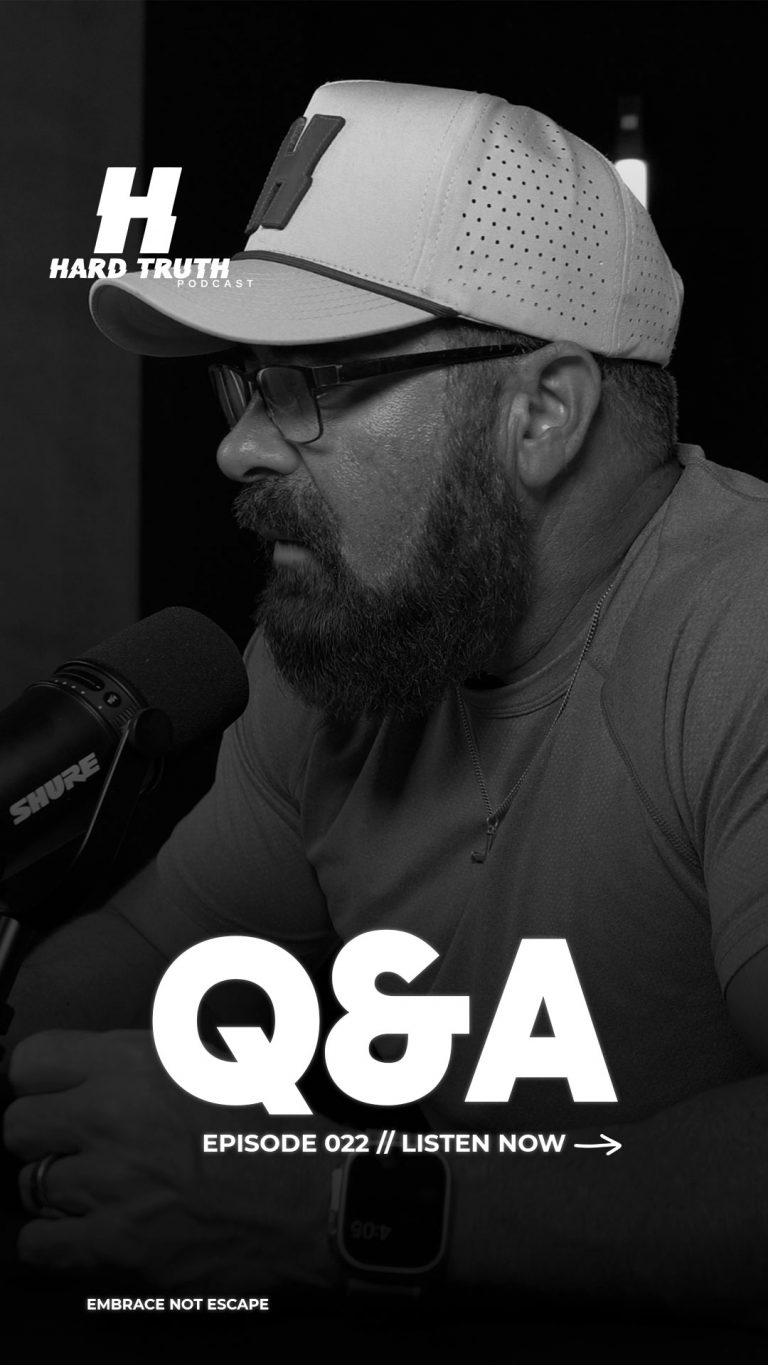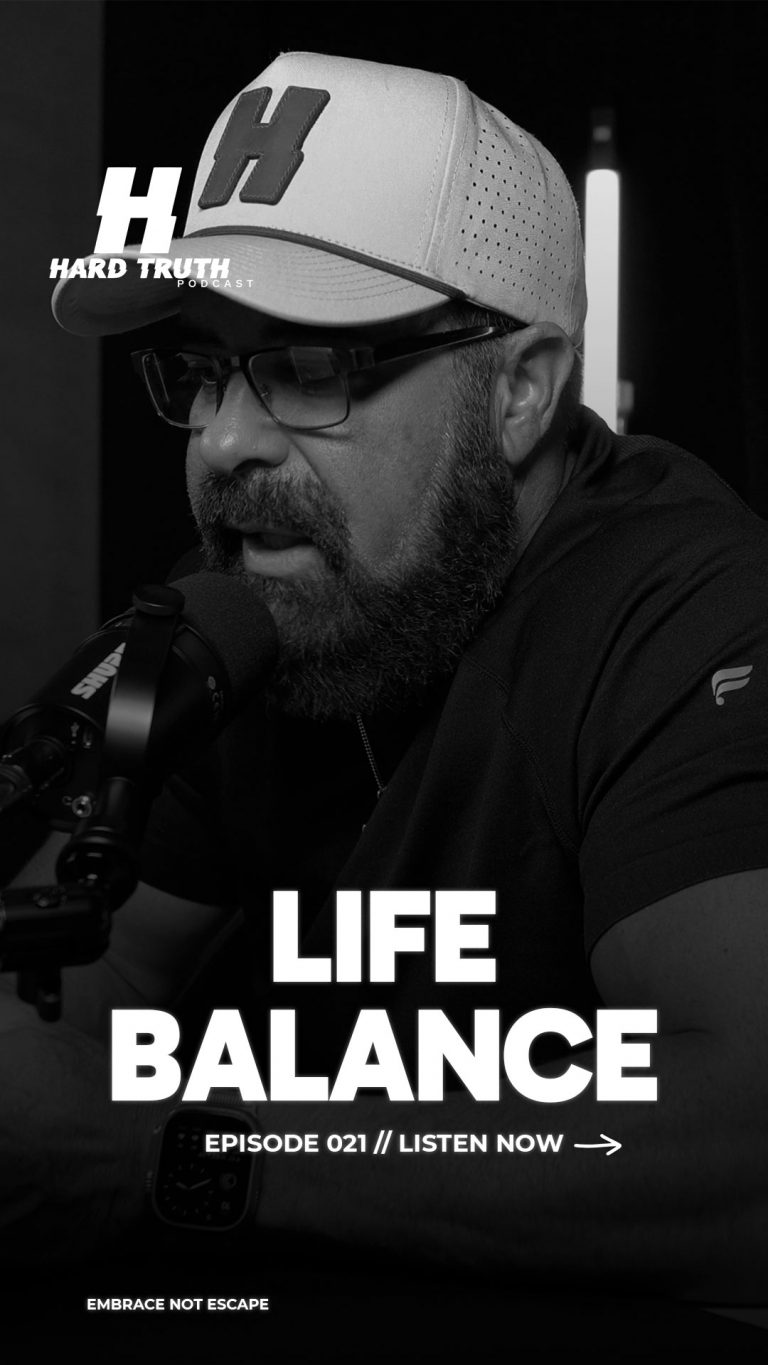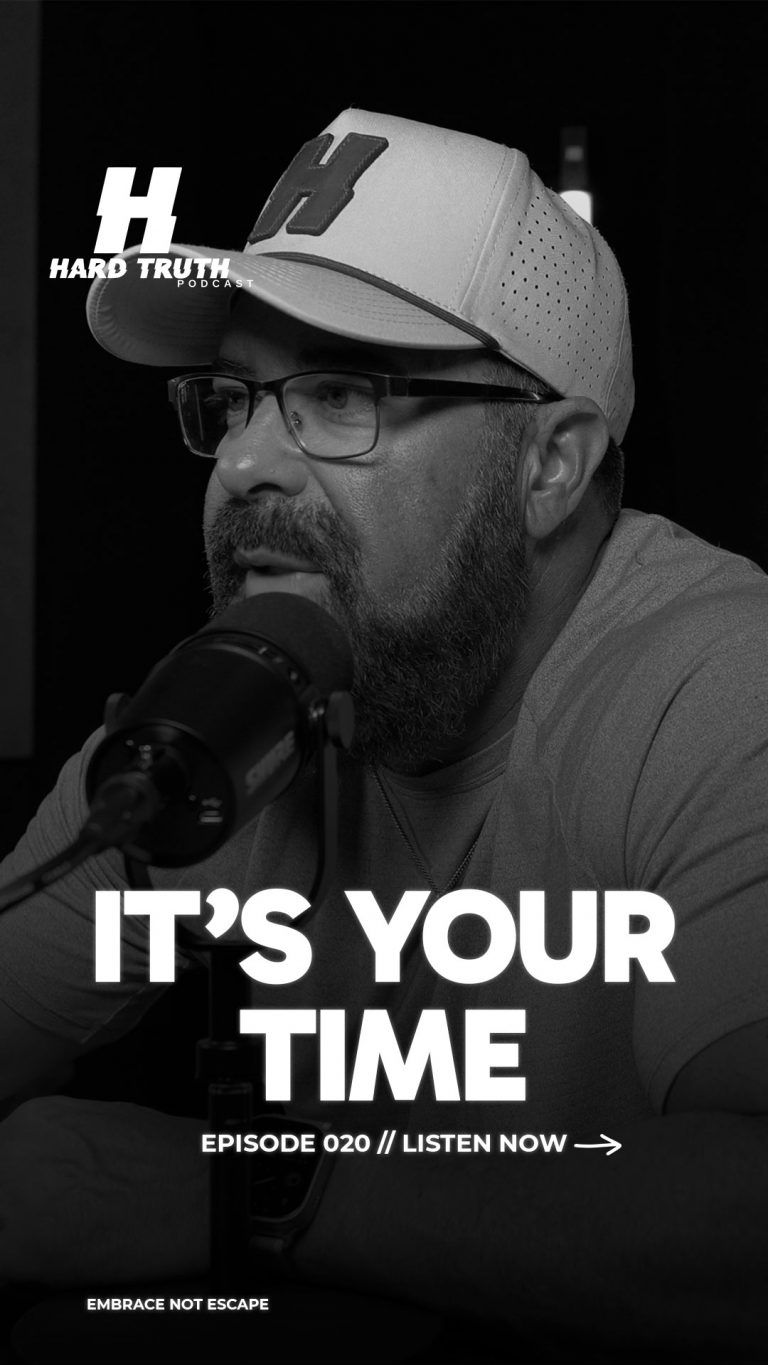Welcome back to The Hard Truth Podcast.
Today, we’re going to be talking about feeding your future, discovering the importance of nutrition.
Yes, it does make a difference, the food you put in your body that determines the outcome of your future.
So diving right into the podcast, fueling the body with the right amount of fuel and the right fuel.
So we’re gonna talk about first and foremost, fueling the body with the right amount of fuel.
You know, this is something that a lot of you probably have never sat down and figured out.
So I’m gonna talk to two different types of people here of determining the right amount of fuel.
So I’m gonna be talking to a 200 pound dad bod that needs to be weighing about 180.
And then I’m gonna be talking also to 165 pound, maybe a sophomore in college, junior in college, that wants to play baseball or football or lacrosse or basketball at a D1 level.
Obviously on the male side, sorry ladies, but you can still take this information and put it to good use.
And this is something that is important to me.
I do have a 16 year old trying to get to that next level.
And this discussion comes up on a daily basis.
And I work consistently with dads that have the dad bod that we’re trying to lean up to get down to where they wanna get to.
So we’re gonna, first and foremost, what you need to do is determine your maintenance calories, both of you, the 200 pound dad bod and the 165 pound athlete.
So what we’re going to do in determining that is we’re gonna take your body weight times your activity, and that’s gonna give us our maintenance calories.
So let me give you an example.
Here’s a sheet that I’ve always used that is pretty consistent.
Obviously, you can keep up with your calories and what you burn on an Apple Watch, Fitbit, all those different things.
And I would tell you that those tools are good for, you know, giving you an estimate, but you also need to kind of have a real understanding of how close that estimate is.
And this is something I’ve used that I read in the book probably about 10 years ago, and we’re gonna take your body weight times your activity.
Now, your activity, a 10 is just walking every day.
10 is just, you know what, I go to the mailbox, I walk here, I walk here.
You know, I’m not that person that just wants to sit on the couch and then just get up and go to my computer and come back, sit on my couch and go back to bed.
A 10 is somebody that has some type of activity, but is not intentionally going to the gym, not somebody that’s, you know, trying to say, I’m gonna go on a three mile walk, but that’s a 10.
11 is someone that works two workouts a week.
12 is someone that works three to four times a week.
13 is four to five workouts a week.
14 is six plus workouts a week.
And then 17 is an athlete that is very busy playing a lot of sports.
So what we’re going to do, we’ll give you two examples.
If you’re a 200 pound dad, maybe you’re a 200 pound mom, and you say, you know what, I need to, I work out two days a week, we’re going to take 200 pounds times 11.
That’s the number that you said that you achieved.
And that would be 2200 calories for your maintenance.
Okay, so if you’re 165 pound athlete, and you are probably going to turn that times that by your activity level of 17, that means that person is probably burning maintenance level calories at 2800.
Now, that does not include game day.
That does not include all the different, you know, all the game day weekends or, you know, that type of stuff.
They’re going to burn a lot more than 2800, but day in and day out, they’re going to be burning around 2800 calories.
Now, if you’re a dad bod, then obviously you probably want to get into a deficit mode.
You want to say, you know what, I want to get down to 180, what do I need to do?
Then you’re going to take your average maintenance calories of 2200, and you’re wanting to cut that down to probably 300 at least, or maybe even 400, or maybe you want to start off at 300 calories to 1900, and then after a couple of weeks, cut it down to 400, which is around 1800.
So that’s how much fuel you need in a daily basis.
Now, I tell everyone, you have to track what you can’t track, you cannot measure.
I deal with this a lot with young athletes that come to me and say, I want to put on muscle.
I’m like, OK, we got to have more fuel in order for that to happen.
And they’re like, well, I’m eating good.
Well, what are you eating?
I’m eating cheese pizza.
Well, that’s not going to work.
OK, cheese pizza is fine, but we have no protein in cheese pizza, very little other than the cheese, and we’ve got to have a lot more protein.
And then I get them to tracking on a daily basis what they’re putting in their body, and they’re like, oh, man, you’re right.
I’m not putting the right fuels.
Same way with the dad bods or maybe a woman that wants to lose weight to get ready for the summer.
You have to track it or you cannot measure it.
So get you away.
I use the CoreVeev app, and actually, I go on.
I put in my foods that I eat in every meal.
I track everything.
If I know what my go is, is 1800 calories a day, then I figure up exactly by just punching it in on the app, and it tells me at the end of the day that I reached my go, went over my go, or under my go.
You have to track it.
So that is the first thing.
Determine if you want to be in a deficit or surplus.
Obviously, if you’re a young athlete, you’re trying to get to that next level.
Like, for example, I gave the 165-pound kid, we times his activity level, which we determined was the 17, 2,800 calories.
I would tell him or her, if she’s trying to put on or he’s trying to put on muscle and get to the next level, I would tell them they probably need to have a surplus of 500 minimum on that 2,800.
Now, every young athlete is different.
You might want to start off with 300, because you have some of these kids that say, you know what, I don’t know.
I’m full.
I hear that excuse all the time.
Well, I’m just full.
Well, when you go to the gym and the weights get heavy, do you stop or you keep going as much as you can, and then you keep getting bigger and you keep getting stronger, and then all of a sudden you can do more weights.
It’s the same way with eating.
You don’t stop just because you’re full.
You eat a little bit more.
You start expanding the stomach, bringing in those calories, and then you’re going to see change in your performance.
Now, what are the main parts of nutrition that you need to be conscious of, that you need to track?
And I track all of this in my Core VVAP.
I put exactly how much proteins I need, exactly how much fats I need, exactly how much carbs I need, depending on what I’m doing.
If I’m trying to build muscle or if I’m trying to be in a deficit and cut, so I determine all of that, put it in my app, and it tracks everything for me.
Now, before I get into this, I will say one of the biggest excuses that I hear is people saying, you know, two things.
Number one, they’ll say, well, it costs so much money to eat right.
No, it don’t.
God gave you one body.
You can never, ever buy another body.
It’s going to cost you more if you neglect your health to try to buy back the health later on that you neglected.
Trust me on that.
Figure out a way, cut the Netflix off, you know, whatever you need to do.
People make that excuse.
Well, it’s expensive to eat healthy.
Well, no, George, but you got one body.
Would you want to take care of it and live a good quality of life?
Or you want to be that person that is sick and have all these different problems?
And just because you can go to McDonald’s and Carl’s Jr.
because it’s cheaper.
I mean, you got to get that out of your head.
The second thing that a lot of people say, well, it takes time to eat right.
Well, yeah, it does.
But again, you gave one.
You got one body.
So get off the TV, get off the phones, do whatever you have to do and spend your Sunday afternoon to meal prep to do what you need to do, because I promise you, you know, good eating habits and putting the right fuel in your body, this is not something that’s just going to make you feel, or excuse me, make you look good in a bikini or with our man taking his shirt off.
Yes, it’s going to do that.
But the big part is the internal process of the person it’s going to make you become.
And literally, your relationships are going to improve.
You’re going to make more income at your job.
You’re going to become that person of confidence that you walk in a room, you’re going to own that room, and you’re going to be that example if you have kids that say, you know what, I want to be proud.
I’m proud of my dad.
That’s my dad.
He’s the jacked one over in the corner.
You know, that’s my mom.
She’s the one in the size four or size six, and she’s got a six pack abs and her arms are lean.
You want that experience, guys.
Trust me on that.
So let’s talk about the three most important parts of macros, and I’m still going to do a podcast and break down.
You are help you figure out exactly your macros.
But I love the core V app again because literally once I determine that it calculates everything for me.
But today I’m not going to have time to break all of that down.
So carbohydrates, what is the main portent?
So we’re going to be talking about carbs, proteins, and fats.
Okay, we need all of these in order to have optimal health.
But carbohydrates, they are the body’s primary source of fuel during intensity exercise.
Now, I will say this to you dad bods that you’re not going to have a lot of the carbs that the athlete is going to have, and the carbs that you are going to have, you’re going to need to lean more towards the sweet potatoes, the fruits, all of those top things.
And you say, well Jeremy, how do I know?
Well, once you know how much carbs you need, then when you start plugging in, we always start with proteins first, and then we come up with fats, what we need on our fats, and then we determine our carbs.
Well, there’s too many calories in four pieces of bread that you’re going to be over your calories.
So that’s not going to work for you dad bods.
You’re going to need to eat more of your carbs in your fruits and your other good, dense foods like your sweet potato and that type of thing.
But I don’t have time to go into all that.
So what is the real big reason for carbs?
Carbs is that main fuel source for your young athlete and for you before you go to the gym and in helping your body recover afterwards.
So that is very important for you to understand.
Proteins are what’s going to help repair and build muscle tissue.
And while fats are going to be more of your concentrated source of energy.
So if you eat an avocado, you take some nuts, that’s going to be a longer, slower release of energy source than a carbohydrate.
Okay, so let’s talk about recovery now.
So we know it’s very important, and I’m going to be talking about other performance things here in a second.
Very important for protein, fats, and carbs.
What is the other importance other than performance?
It’s enhancing recovery.
Guys, nutrition is what helps the body recover faster.
After exercise, it helps replenish the glycogen stores and helps repair your muscle tissue and helps reduce the inflammation.
It is sad for me.
I have one son that plays lacrosse on the East Coast, West Coast.
We have another son that plays baseball all over the country.
I watch these athletes literally tear down their body, and they’re drinking Gatorades with dyes and all these bad things.
They’re grabbing one little piece of cookie, no proteins, no good carbs, no good fats.
Then the next day, they show up, and they have leg cramps, they have sores.
They’re not recovered.
And then, same way with the dad bods that maybe say, I listen to The Hard Truth Podcast, I’m going to go out and lift weights like two or three days, and then they go lift weights for two or three days, and then they’re sore for a week and can’t move.
It’s because, number one, you probably did too much because you become too ambitious.
But number two, you have no idea how to recover the body and the importance of these three macros that you need in order for your body to recover.
I mean, think about this, guys.
Our body is an engine, and you have a car.
You want to fill up that car in order for you to get to the other side of the state of Texas.
Well, so you’ve got to determine how much fuel you need, number one, and put the amount of fuel that you need to get on the other side of Texas, which is a big state.
But also what you don’t want to do is stop at a gas station and put bad gas in because you’re not going to make it.
So figure out the fuel you need, and then figure out the right type of fuel for your body to be able to perform and to recover.
So you have to have that in order for it to happen.
Another important part of recovery, and not only just these three macros, which I’m going to talk more about the proteins and different things on down as I go, is you have to stay hydrated.
Now, obviously, you know, I’m a big believer in Corvive hydration product, which is currently right now in seven Major League Baseball teams being used in the products.
It’s NSF certified.
It is a powerful hydration product.
You have to have hydration for your body to help flush out the lactic acid, to help with the soreness, and then also to help with endurance and preventing dehydration.
You know, I watch these kids and these older older gentlemen and the ladies at the gym drink in the Celsius, and they’re in there pounding these Celsius with caffeine and different things.
And then they’re not having no awareness of that caffeine and what it’s doing from a dehydration standpoint and not drinking anything to hydrate their body.
You have to find a way to stay hydrated, and it’s also going to help with your performance.
The other most important part about the macros and getting the right macros in your body is for boosting strength and muscle growth.
Protein is king.
For me, it’s lean meats, eggs, and I do drink a lot of our protein shakes here at Corviva.
I love them because they taste great.
It’s grass-fed whey protein plus the collagen, 23 grams of protein.
It’s easy on my stomach.
That is what I love the most, but protein is king.
I wake up every morning, I eat four eggs, and then I drink a protein shake.
The four eggs is 24 grams of protein.
The shake is 23 grams, right at 50 grams of protein.
I go to the gym, I work out, come back, I drink two more protein shakes, mix it up in a blender with some PB2, and then ice and water, and I get another 50 grams of protein.
And then two hours later, I also do Greek yogurt, mix up a protein powder in that as well, mix it up, it’s like pudding, turns into like a pudding, and I put a little bit of dark chocolate, cacao nuts, or cacao little niblets or whatever they call them on top of that, and that’s what I eat, that’s another 50 grams of protein.
So I literally have 50 grams when I wake up, 50 grams after my workout, that’s 100, and then I also have another 50 grams for my mid-morning snack, that’s 150 grams of protein that I bring in, and literally by 10.30 in the morning, and I consume about 250 grams of protein a day.
You’re listening and say, I don’t know how much I need.
Protein-wise, I would tell you, for a man that is trying to put on muscle, I would like to put on no less than 1.25 times your body weight.
For young adults that I’m working with athletes, my 165-pound young athlete, I would tell him he needs at least 165 grams of protein.
Once we get all that dialed in, I would probably increase that depending on how he’s doing in his eating schedule and things like that.
So that’s very, very important to know how much protein you need.
I put lean meats.
I eat a lot of venison, a lot of elk.
I also eat a lot of grass-fed beef.
I love buffalo as well.
We go to Costco, you know, and we try to be conscious of that.
I also do a lot of brisket.
Costco is where I buy a lot of my brisket.
I’ll smoke a brisket.
I do chicken.
I do two chickens every week.
I put it on the Traeger with my brisket on Sunday, and then everything is made for my meats through the week if I did a brisket and two chickens.
I also love tuna, but you figure out the protein source and have a plentiful amount of protein that you’re going to have throughout your week.
So protein is key for strength and also for you to be able to help with muscle growth.
The next part is a lot of people say, okay, you talk about young athletes.
You talk about, you know, the reason for these macros to help me if I want to lose weight, you know, I don’t want to be ashamed to take my shirt off this summer like I always am.
You know, what other benefits does, you know, feeding yourself the right macros and pushing yourself in the gym, what other benefits does this have for me listening?
Well, it’s supporting your overall health, guys, with proper nutrition, which is going to help not only from athletic performance, but your mindset, you know, you better sleep, you know, the nutrient dense foods such as fruit, whole grains, all the lean proteins, it’s got essential vitamins in it and minerals and antioxidants that’s going to help support your immune system, help with inflammation, and just promote better health.
You know, what’s wrong with today’s society?
Everybody’s grouchy and grumpy because they don’t feel good.
You know, and then we go to the doctor.
Doctor don’t know what’s wrong with us, but he puts us on a medication and makes us feel worse.
And then we go back and get another one.
And you know, we’re looking for, you know, alcohol or all these other different things.
I mean, I’ll talk about on my podcast, learn how to embrace the opportunity, not escape because so many people, if they don’t feel good, they never think to say, how much protein did I have?
How much carbs did I have?
How much fats did I have?
Which helps with my hormones and, you know, and my libido and all these different things.
How much sleep did I get?
Well, you know, if I didn’t sleep good, maybe it’s because I didn’t go to the gym and push myself.
I sat at a desk all day.
All of that comes together.
You know, one of the things that I really try to determine with a young athlete especially, I’m telling him, look, if you’re playing video games all day and you’re not working out, you’re not going to be as hungry.
If you don’t work out, you don’t eat right, you’re not going to sleep right, and it’s going to be a vicious cycle.
It’s the same way with us adults.
We get up, we drag ourselves out of bed, we go straight to the coffee machine, we then grab some carbs, we don’t go workout, we go to work, we deal with all this stuff, we don’t literally do anything good for our body, and then someone asks us to go eat Mexican food, we eat chips, we eat salsa, and then we go after that, and we go to happy hour, and we have a couple happy hour drinks to make us feel better, and then we come home, we have a couple more, and then we eat bad food, and then we say we can’t sleep because our mind won’t turn off, and so we have a couple more, and then we get to bed, and we wake up, And we do the same thing all over again.
Guys, I’m not just talking to the young athlete or the dad bod that says he wants to take his shirt off, or the mom that says, you know what, I’m tired of not being an example for my kids.
I want to look good in a swimsuit this summer.
I’m tired of the way I feel.
I’m talking to someone that understands the importance of you have got to understand how good you could feel once again, if you understood the fuel source that God has provided to us, that we are not putting in our mind and our body and all the things that we’re needing to do on a daily basis to achieve that optimal health.
Trust me on that.
If you dial in today how much protein, carbs, and fats you need, you determine what you need to do from a workout standpoint.
You set some structure in your home on a sleep pattern.
You stay off the phones a little bit more, and you feed the mind with good positive books.
You’re gonna achieve the optimal health and change your life.
So guys, I hope you enjoyed this episode.
If you did, share it with a friend or family member.
Maybe that’s in a rut in life and says, you know what, I don’t even know what a macro is.
Great, listen to this.
This is just the opening part of what you need to listen to in order to understand how much fuel you need, and then what is the right types of fuel.
And then hopefully they can say, I’m ready to feed my future to understand the importance of nutrition.
Follow me on social media, jeremyfouts.com.
Thank you guys for joining.

